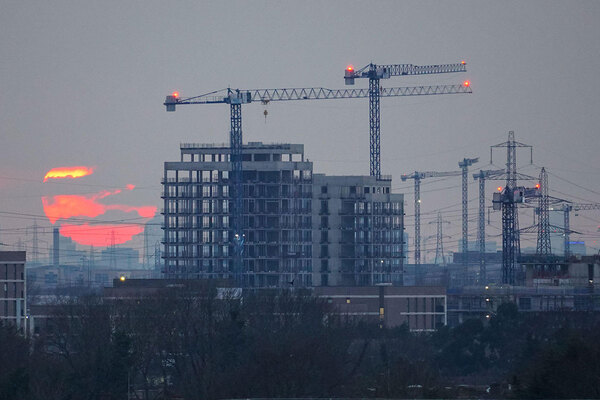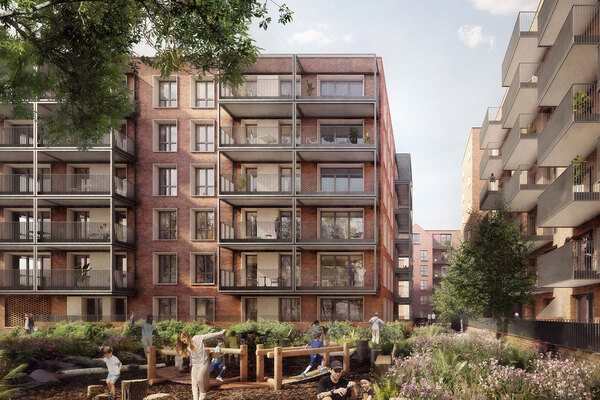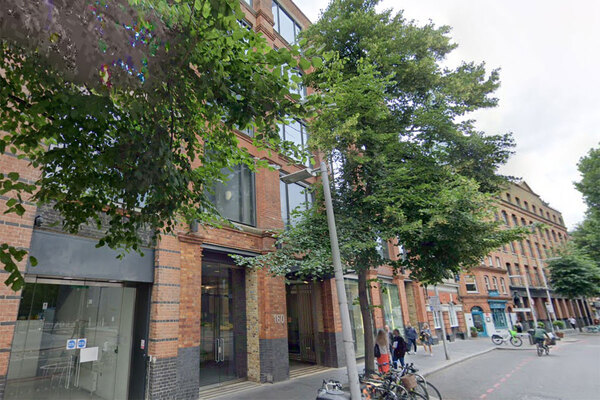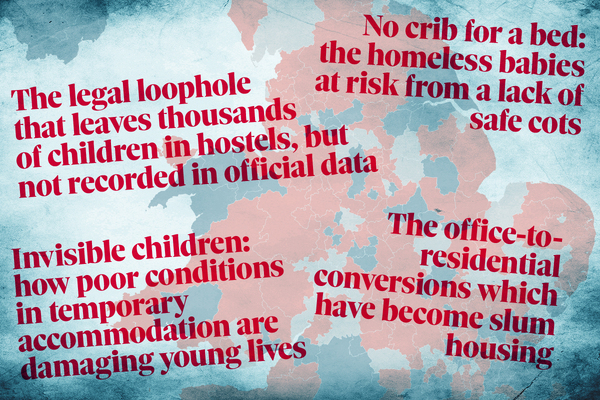Spotlight on vulnerabilities: ombudsman calls for royal commission on housing
The Housing Ombudsman has called for a royal commission to “create a long-term plan for social housing” after finding that current approaches in the sector are “not working” for vulnerable residents.

The commission would be independent from the government and would re-establish the link between health and housing.
The call comes in the Housing Ombudsman’s new Spotlight on: Relationship of Equals report, which focuses on attitudes and approaches to vulnerable residents. It found that 68% of tenants said their landlords did not make reasonable adjustments when explicitly asked to.
“What’s clear is that when we reviewed cases for reasonable adjustments, there were few, if any, examples of where landlords had done [them] well,” housing ombudsman Richard Blakeway told Inside Housing.
Case studies in the report included a landlord making insensitive comments to a mother about her terminally ill daughter; a domestic abuse survivor being advised by the landlord to return to the property where her abuser was; and a resident’s mental health being blamed for the landlord missing repair appointments.
One resident was told to be “nicer” if she wanted better treatment by contractors. In another case, a landlord told a resident it was “surprised and disappointed” she had raised a complaint.
The ombudsman also found an inadequate understanding among some landlords of their obligations under the equality, human rights, and care acts.
The report called for a new definition of vulnerability, while the establishment of a royal commission would seek to “re-establish housing policy as a health intervention and proposing a long-term strategy for social housing”.
It highlighted a need for a “human-centric” provision of services and an approach that takes individual circumstances into account. The report also called for a renewed definition of general needs, alongside a duty to co-operate between agencies such as health bodies and social landlords.
Mr Blakeway said: “The effect of a combined cost of living and housing crisis has put parts of the sector at breaking point, compounded by a narrow vision of what social housing is for – one which is far removed from its conception 150 years ago.
“This presents choices for government and society, as well as landlords and residents, about what sort of social housing the country wants.
“This sector has a proud history of tackling social injustice and this housing crisis speaks to new social injustices in health, equality and race and it can rise to this challenge for the benefit of the country.
“Our calls for a royal commission, which is independent of government and not impeded by politics, could be transformative.”
Recommendations in the report that landlords should implement include:
- Implement a vulnerability strategy, including how ‘vulnerability’ is defined, who assesses, and what the review process is. This must be in line with the Equality Act, Human Rights Act and Care Act
- Test the policy in practice against the 3 Rs: recognise, respond and appropriately record vulnerabilities
- Implement a specific reasonable adjustments policy
- Carry out a ‘resident of the future’ forecast for the next 10 years, drawing upon the available information around demographics, both locally and nationally
- Introduce minimum staff training requirements such as Dementia Friends, and training on customer care, mental health, learning disabilities, and sight and hearing loss
- Undertake a review at board level as to whether the organisation is currently offering a ‘human-centric’ service provision and identify the barriers to why it is not currently the case
- Ensure awareness and accessibility to the complaints procedure
Findings
The ombudsman surveyed tenants, social landlords and advocacy services for the report.
Most residents rated their landlord between three and five – five being the best – at keeping them informed about changes to rent and service charges.
However, for everything else, more than half of residents rated their landlord one – the lowest possible score – which suggested residents perceive their landlords as being more interested in money than anything else. One resident told the ombudsman: “We are powerless cash cows.”
Of the 1,275 residents who responded, 58% said they considered themselves to have a disability. Of those, only 19% said their landlord had made reasonable adjustments for them.
A small proportion of residents (5%) said they had not told their landlord about their requirements or otherwise had not asked for any adjustments.
However, 68% said that their landlord had not made any reasonable adjustments despite being asked to. Many respondents referred specifically to the lack of aids and adaptations in their home.
Digital exclusion was a significant issue for residents with vulnerabilities, who referred to a loss of letters, estate notice boards and face-to-face contact.
One resident said: “For them to say that ‘email is easier’ isn’t good enough. How many disabled, poor and elderly residents have missed out on this communication?”
Another issue residents reported was difficulties contacting landlords. The majority of landlords (88%) agreed that there were barriers to effective communication with their residents.
The biggest barrier they cited was a lack of resources, followed by a breakdown of trust between tenant and landlord.
One respondent said the declining provision of social care and the provision of statutory services by local authorities and their third-sector partners “means an increased need for landlords to manage often really complex situations with limited professional support”.
However, landlord respondents also said that the internal culture and attitude of their organisations hampered communication with residents. “Tenants who challenge the chief executive and directorate’s narrative are seen as troublemakers to be quashed,” one staff member said.
Advocacy services
The vast majority of advocacy services (94%) reported that there had been an increase in support requests over the past 18 months. Staff at Citizens Advice reported an increase in requests for support from social housing residents, mainly for help with repairs.
Several advocacy service respondents referred to the difficulties some residents experience in navigating telephone call centres. They stressed to the ombudsman the benefits of in-person contact and support for vulnerable residents.
Advocacy services said “disillusioned” housing staff was an issue. One described “housing officers who have become completely disillusioned with the work that they do”, while another said landlords can be “obstructive and reluctant to carry out repairs”.
Mr Blakeway told Inside Housing that there is a “systemic” problem in the sector with the role of the housing officer in terms of underinvestment and retention.
Inside Housing previously spoke to housing officers about the pressure they are under.
He said: “This is an enormous issue, but I think this report is seeking to not only ensure that residents are treated with respect and that their rights are recognised, but it’s also seeking to be really clear about you develop these vital roles within landlords so that they’re able to respond effectively to residents and the changing needs of residents and the changing pressures on the sector.”
Case studies
Case studies in the report highlighted issues with processes – policies and procedures – communication, the behaviours of landlord staff, attitudes, tone and approach.
In one case, a woman who was suffering cancer was made homeless during the coronavirus pandemic after her landlord mishandled her report about her mother being violent toward her and did not take appropriate action.
In another case, a woman left her home due to domestic abuse. When she contacted her landlord for advice about her tenancy, it told her to return to the property and contact the police if her ex-partner denied her access.
The report also highlighted landlords using inappropriate language and tone while complaint-handling. One landlord said they were “surprised and disappointed” to receive a complaint.
Another informed the resident they would not respond to their complaint as it had “done nothing wrong”, while another landlord informed a resident it was replying “out of courtesy”.
The ombudsman told Inside Housing that the attitude was “parental” and feeds into the stigma social housing residents feel.
Mr Blakeway said: “Some of the tone is obviously troubling, particularly around raising complaints: ‘surprised and disappointed’ or ‘we’re not going to accept this complaint because we’ve not done anything wrong.’
“Those are very parental attitudes presented to residents, which speaks to that stigma that residents have spoken about.”
Though the cases are more rare, the ombudsman also found a failure by landlords to investigate allegations of discrimination.
The report included examples of good approaches taken by landlords when they recognise that a resident has a vulnerability and are really sensitive about the way in which they communicated with that resident.
Mr Blakeway explained: “For all the complexity, I think there are some clear and, arguably, simple things that need to be done.
“Listening to the resident, being clear about your process, and communicating effectively.
“Communication is such a strong thread throughout this report.”
He urged landlords to explain the rationale for why they have done something and that if they commit to doing something, do it in the timescale they said they would do it in.
Definition of vulnerability
The ombudsman defined vulnerability as: “A dynamic state which arises from a combination of a resident’s personal circumstances, characteristics and their housing complaint.
“Vulnerability may be exacerbated when a social landlord or the Housing Ombudsman Service does not act with appropriate levels of care when dealing with a resident’s complaint… if effective reasonable adjustments have been put in place, the vulnerability may be reduced.”
Mr Blakeway said there is “clearly a propensity for some landlords to consider vulnerabilities purely in terms of the Carers Act and safeguarding”, which then take a “very narrow view of it”.
He said: “I think some of it is genuinely an identity crisis within some landlords in some parts of the sector about what is their role, where are their responsibilities, what’s the line between them and other services.”
Data on vulnerabilities
The watchdog’s last Spotlight report found that poor record-keeping was ubiquitous in the sector and causing “daily detriment to residents”.
Mr Blakeway said: “You’ll see from the previous Spotlight report [that] knowledge and information management can be quite poor across the sector.”
The Information Commissioner’s Office published advice in December to help housing associations comply with data protection law.
Mr Blakeway said: “There is really an issue there where sometimes landlords are not recording information that they should record to the detriment of both their service delivery, but also the individual resident, because of misplaced concern around data protection.
“From a resident’s perspective, it’s about knowing information which is valuable for services to be delivered in the most effective way, rather than residents feeling that their privacy has been compromised.
“But in some of those cases, there’s not really much of a question there about whether the resident wanted the landlord to know about their circumstances: the resident was being explicit about their circumstances.
“It’s that sometimes landlords are missing when it’s been so clearly communicated to them. Why doesn’t it get recorded? Why isn’t it being recognised? Why isn’t it being responded to effectively?”
He added that there is a “kind of dissonance” between landlords saying they are doing “more than they’ve ever done before” to try and address the needs of vulnerable residents, when at the same time the ombudsman is seeing vulnerable residents not receiving a level of service they should at levels higher than it has ever seen.
Resources
The report makes an “emphatic” case for government action and resources to support social landlords because the current arrangements are “not sustainable”.
Mr Blakeway said: “The landlords who responded to the call for evidence were clear that the number one barrier for them is resources.
“Clearly in the past few months and years, there’s been a reevaluation of landlord priorities and how different service areas are resourced.
“What you’ve seen as a consequence of under-resourcing of frontline teams, under investment and development of the housing officer role, is presenting itself in the cases that we’re handling as an ombudsman.
“There’s something about the total funding envelope and the sources of that envelope, and then there’s something around prioritisation within the landlord.
“There’s got to be some really clear-sighted decisions about the amount of resource that frontline teams need, the amount of resource that complaint handlers need, the amount of resource that systems and systems management need so that a landlord can act with agility in response to issues.
“There is a brain drain occurring in frontline staff and I’m really concerned that some frontline staff are demoralised.
“Part of that is leaders being really clear about actually how they invest in those roles, and in those areas because it’s just been under invested in.
“But that will require more money within the landlord and also more money within the system, and therefore government has a role to play here for the sector to respond effectively to the pressures that are presented.”
Royal commission and multi-agency approach
A new royal commission on housing would consider the role of public money, presenting a single view of welfare, health and housing spend, “given the siloed approach that has existed across all governments for too long”, Mr Blakeway said in the foreword of the report.
He told Inside Housing: “The majority of our most serious findings would involve a vulnerability of some form and around half would involve issues related to mental health.
“The sector is not in a bubble. It knows that and it’s about how to effectively respond to that.
“A multi-agency approach is absolutely right. Greater support and clarity from the role of government and policy makers more broadly I hope would be welcomed by the sector because I think that’s overdue.
“And then re-establishing this link between housing and health, which is such a constant presence in our casework, combined with a recognition that the landlord is one of the most visible and immediate influences on a resident and how therefore do you reimagine the provision of services that doesn’t see the landlord sometimes feeling like it’s the last body that’s engaged or the last service that’s engaging with the resident when other services have retreated.”
Sign up for our asset management newsletter
Already have an account? Click here to manage your newsletters











